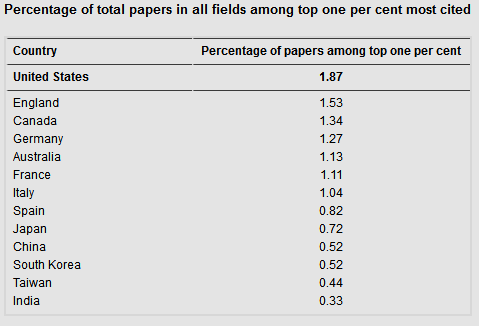|
|
|
|
|
|
|
News & Views item - March 2012 |
![]() Australia's Chief Scientist Outlines a Science and Future Scenarios Scorecard.
(March 12, 2012)
Australia's Chief Scientist Outlines a Science and Future Scenarios Scorecard.
(March 12, 2012)
 Australia's
Chief Scientist, Ian Chubb, was in Perth a fortnight ago addressing the
Australia-Israeli Chamber of Commerce on the topic of "The Nation's Scorecard on
Science and Future Scenarios to 2025", which all things considered isn't that far
into the future; after all the current war in Afghanistan is almost 11-years in
duration.
Australia's
Chief Scientist, Ian Chubb, was in Perth a fortnight ago addressing the
Australia-Israeli Chamber of Commerce on the topic of "The Nation's Scorecard on
Science and Future Scenarios to 2025", which all things considered isn't that far
into the future; after all the current war in Afghanistan is almost 11-years in
duration.
Anyway, Professor Chubb, after noting that "innovation, especially in science and technology, is at the crux of economic development", proclaimed that old chestnut that Australia: "With 0.3% of the population, produces around 3% of the world’s scientific publications", a meaningless statistic unless comparison statistics are given, for example, for the OECD countries.
However, here's a nice table for Professor Chubb to quote -- though it encompasses the years 1996-2006 -- which shows that of the scientific papers a nation publishes what percentage get into the top 1% cited. Australia comes a creditable 5th, but the US is still well out in front.

Credit: Thomson-Reuters Intellectual Property & Science
Nevertheless, the Chief Scientist shows a streak of brutal honesty when he points out that on a comparison basis Australia is backsliding:
Australia's, rank on the global competitiveness index has been steadily falling for the past decade – last year we were ranked 20th overall. In 2001 we were 5th.
As you drill down deeper, there are even more troubling figures. In the latest report, we rank 27th on capacity for innovation. On availability of scientists and engineers, we ranked 60th, out of 142, just scraping into the top half. On the availability of scientists and engineers, Israel ranked 10th... [and] Australia ranks 19th on the global competitiveness index for the quality of math and science education,
Alluding to the report on Australia's scientific health that his office has been working on for the past half-year he singled out what he considers the two most worrying areas which are dependent on research and development -- agriculture and engineering: "the Australian agricultural industry is becoming more and more vulnerable as student enrolment numbers continue to fall. In engineering the story is similar. Australia produces less than half of its annual engineering workforce needs, with only around 6000 graduates annually. The peak body Engineers Australia has reported that there is a shortage of 20,000 engineers right now.
He concluded by informing his audience that he would be be submitting to Prime Minister Gillard in the coming week (i.e. this past week) that he would be: "strongly advocating to engage industry and bring cadetships back to the forefront of university degrees. Students often disengage from mathematics and science because they cannot see real world applications of their studies. But cadetships give students the chance to see the relevance of their work, the potential they hold to improving the quality of life of Australians. So I encourage you all to consider the possibility of cadetships in your own organisations – whether scientific or not.
At this stage we don't know the full content of the Chief Scientist's report to the Prime Minister, so what his recommendations are with regard to the support for K-12 STEM education remains to be seen, but if it is not addressed, the matter of "strongly advocating to engage industry to bring cadetships back to the forefront of university degrees" will be of no consequence.